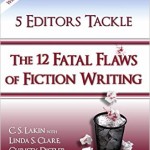 In recent years, the writing resource shelf has been inundated with guides that promise to help writers do everything from transform their story to create a bestselling novel. I have a big collection of these books myself. I’ve wondered what writing books really give us writers down in the trenches.
In recent years, the writing resource shelf has been inundated with guides that promise to help writers do everything from transform their story to create a bestselling novel. I have a big collection of these books myself. I’ve wondered what writing books really give us writers down in the trenches.
Writing Tip for Today: What benefits do writing books claim to impart to writers and what do most actually offer?
The Promise of Greatness
Many titles in the writer’s resource category trumpet that you too can write a breakout, brilliant, or bestselling nonfiction book or novel. Language that entices a writer to believe his or her prose is worthy of literature or even NYT Bestseller status is misleading at best and false advertising at worst. Check out Amazon’s category for writing how-to or some well-known authors’ tutoring programs and you’ll find titles groaning under these superlatives. The fact is that writing a book that not only catches fire with readers but also has staying power (think literature) is a combination of several factors. It takes patience, persistence and practice to master the craft and even then your ideas may not achieve the rarefied air of originality. Add to that the changing fads and trends of our global communities and it’s plain that sometimes luck or timing) is a part of the successful novelist’s formula. I personally steer clear of most books/programs which promise greatness.
Basic Understanding
This isn’t to say all writing books are worthless. Most resource books fall into one of three categories: Structural Principles (e.g., how to write a novel or the three-act structure), Revision/marketing techniques and inspiration. The first category, structural principles, can help writers discover missing elements of their works and most provide tests or exercises to help writers uncover flaws and learn the groundwork of good storytelling. Areas such as scene writing, story shape and structure for different types of writing can help a writer progress. Revision or marketing handbooks are great for helping writers figure out what to do with the writing after it’s been drafted. Marketing books outline techniques for getting your work noticed, but usually fail to add that everybody wants to be the “one.” And inspiration books keep our BIC (Butts in Chairs) on days when we feel like giving up, especially after we figure out that hardly any of us will become the “one.” It’s fine to glean techniques and practice applying them—this is where the real learning occurs. If a resource book helps you, by all means use it.
Don’t Be Taken In
So, are writing books worth it? My opinion is a qualified yes. If you keep your butt firmly in the chair and don’t expect the latest guide to catapult your book into the stratosphere on its own, then go ahead and read it. Study the techniques and practice them. A lot. The division between writing as craft and writing that relies on an unquantifiable “talent” or genius is wide as ever and growing. Good writing relies on a solid understanding of all the principles readers appreciate: storytelling technique, impeccable editing skills and even a dose of inspiration. Great writing—the sort that is breakout, brilliant or bestselling—requires even more practice and an ingredient no book or program can teach: the originality, timing and creative genius that comes from someplace beyond craft.





Linda,
I’ve read a few but the best thing I ever did was taking your Crafting the Novel class. I also took an online James Patterson class which was beneficial and entertaining.
Randy Hill
The Oil Conspiracy
Deja Vu in Blue a short story.
Randy,
Ah, thanks. I love teaching writing.
Hope your writing is going well.
Write On,
Linda
You are imparting words of wisdom. (Or words of common sense). Thank you! Yes! I had to laugh (at myself) a bit because so many times I feel like I should be studying, but I need to be doing my BIC time. “Study the techniques and practice them. A lot. ” Great dose of reality.
Thanks, Kristin. You’re one of my best students! You like what I say!
Keep Writing,
Linda
Writing books can be great. But they don’t replace actual writing. You have to put it into practice. At some point, you have to stop reading about writing and start writing. For me, application of knowledge is everything.
Joanna,
So true! I always get super pumped whenever I read a great writing tip but then when I go to apply it to my own work, the tip suddenly doesn’t seem so wonderful or easy.
Keep Writing,
Linda